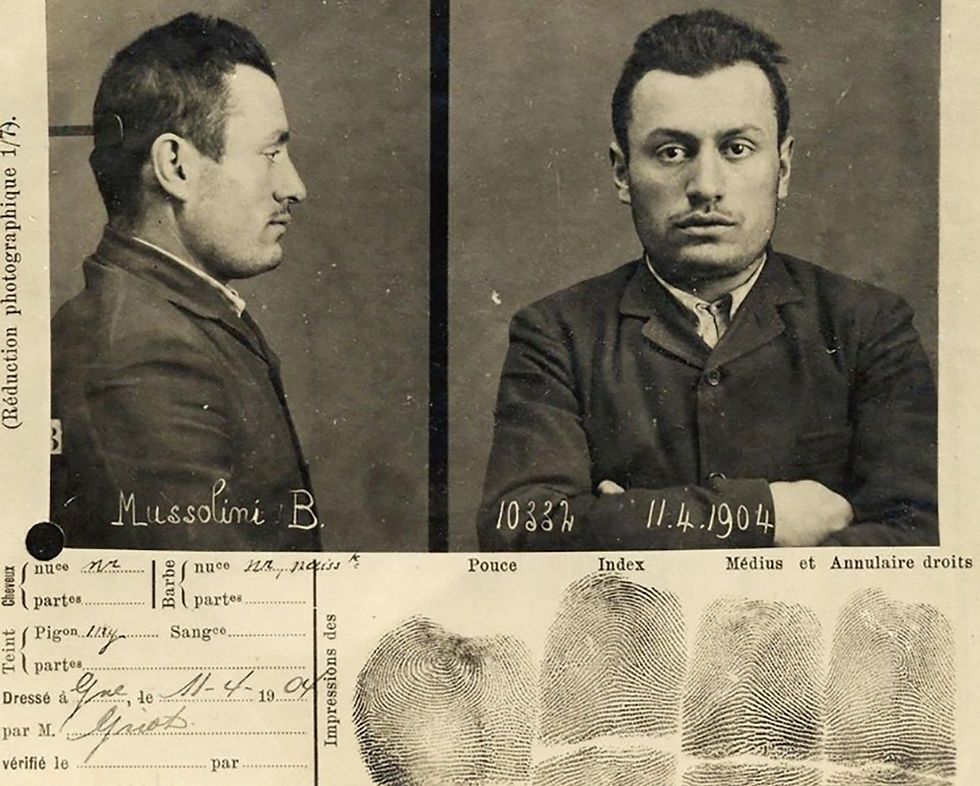Mussolini’s Early Arrests: The Fascist Leader’s Tumultuous Path to Power

In the early 20th century, a young Benito Mussolini was far from the iron-fisted dictator he would later become as the head of Fascist Italy. Instead, he was a passionate, politically radical figure often clashing with the authorities over his fiery ideals. Arrested and jailed on several occasions, Mussolini’s brushes with the law during his formative years offer a fascinating glimpse into the man who would later shape the future of Italy. By delving into Mussolini’s early arrests, we can try to understand how his experiences in prison became stepping stones on his journey towards dictatorship.
The Radical Beginnings: Mussolini’s Early Political Ideology
In his youth, Mussolini was not the Fascist leader he later became; he was, in fact, a fervent socialist. Born in 1883 in Predappio, Italy, Mussolini was influenced by his father, Alessandro, an ardent socialist and anti-clerical blacksmith. Young Mussolini absorbed these ideas, and by his late teens and early twenties, he was drawn into Italy’s burgeoning socialist movement, advocating for the working class and the overthrow of the monarchy.
In 1902, Mussolini emigrated to Switzerland, hoping to escape mandatory military service and find work. However, Switzerland was not merely a place of refuge; it became the setting for Mussolini’s political awakening. Here, he met influential socialist figures and began writing for leftist newspapers, crafting articles that revealed his ability to inspire through words. His outspoken views soon caught the attention of Swiss authorities, who grew wary of his involvement in socialist protests and demonstrations.
The First Arrest: Switzerland, 1903
In June 1903, Mussolini experienced his first significant brush with the law. He was arrested in Lausanne, Switzerland, for inciting a general strike – a tactic often employed by socialists to disrupt the establishment and advocate for workers’ rights. The strike drew the ire of Swiss authorities, who saw Mussolini as a troublemaker. Though he was briefly imprisoned, this encounter only served to embolden him.
Swiss officials considered deporting Mussolini, viewing his radical activities as a threat. Despite the brief duration of his incarceration, this early arrest set the tone for a man who was unafraid to face authority, even if it meant imprisonment. His stay in Switzerland was cut short when, following further pressure from the authorities, he was forced to return to Italy in 1904.

Back in Italy: Arrests and Rising Influence
Upon his return to Italy, Mussolini continued to build his reputation within the socialist movement. He became a prominent member of the Italian Socialist Party (PSI), editing and writing for socialist newspapers. His articles often used powerful rhetoric to denounce Italy’s involvement in colonial wars and the corruption within the Italian monarchy. By 1908, Mussolini had become editor of L’Avvenire del Lavoratore, a socialist newspaper in Trento, then part of Austria-Hungary, where he boldly condemned imperialist ambitions and called for revolution.
However, Mussolini’s fervent writings and speeches frequently brought him under the scrutiny of Italian authorities. By 1911, during the Italo-Turkish War – a conflict in which Italy sought to seize control of Libya – Mussolini vocally opposed Italy’s colonial ambitions. He saw the war as an oppressive act against the Libyan people and led a series of anti-war protests. This vocal opposition led to another arrest in September 1911, where Mussolini was sentenced to six months in prison.

The 1911 Imprisonment: A Defining Moment
Mussolini’s imprisonment in 1911 became a defining moment in his life. Rather than retreating, he used this time to deepen his understanding of political theory and refine his oratory skills. His ability to turn hardship into strength emerged as one of his key characteristics, and prison became a place where he could contemplate his role in Italy’s political future.
The arrest also increased his popularity within socialist circles. By standing against Italy’s colonial endeavours, Mussolini became a hero to those who opposed the war, and his prison time only added to his revolutionary image. Upon his release, he resumed his editorial work, this time for Avanti!—the official newspaper of the Italian Socialist Party. Mussolini’s writings reached thousands, amplifying his voice and solidifying his reputation as one of Italy’s most passionate socialist leaders.
A Shift in Ideology: From Socialism to Nationalism
Mussolini’s time in prison had also planted the seeds of ideological change. With the outbreak of the First World War in 1914, Mussolini faced an internal conflict. Initially, he opposed Italy’s involvement in the war, in line with the socialist stance. However, he soon saw an opportunity to use the war as a tool for Italian unification and national pride. In a surprising and controversial shift, Mussolini broke with the Socialist Party in 1914, advocating for Italy’s entry into the war on the side of the Allies. This move shocked his former comrades and marked his departure from socialism.
This pivot towards nationalism laid the foundation for his later development of Fascism, a doctrine that fused elements of authoritarianism, nationalism, and anti-socialism. His early arrests, his willingness to challenge authority, and his ability to galvanise the public were traits he carried into his new political identity as a nationalist and eventual founder of the Fascist movement in Italy.
Commentaires